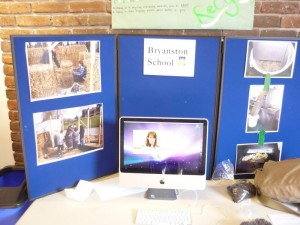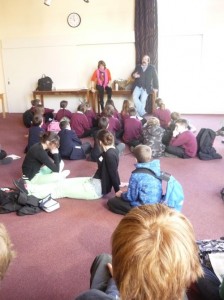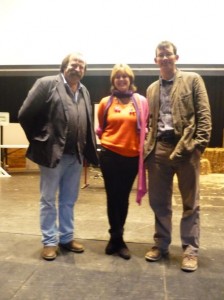8 Mar 2010
A Day at the Dorset Schools Green Summit
Last Friday I travelled to Dorset on a beautiful clear day which turned from a hard frost to glorious sunshine over the time I was journeying. I was going to Bryanston School which was hosting the Dorset Schools Green Summit, drawing together kids from 40 schools across the county. There were various displays, including the new strawbale building the school is putting up, a plastic bottle greenhouse, some PV panels, a thermal imaging camera and electric bikes.
I arrived about 11.30am and went in to watch the end of the workshop being done by Dick Strawbridge (of ‘It isn’t easy being green’ fame) and Julia Hailes, a sustainability consultant. They were showing the kids a range of things, sheepswool insulation, recycled loo roll and a range of other things, as tools to stimulate conversation on various topics. It was very engaging and entertaining, especially the bit about toilets and how much poo weighed (you had to be there…).
 Then, after lunch, I did 3 talks back to back to a third of the group each time. I talked about peak oil, how we find ourselves atop the Energy Mountain, and how we need to design for a way down the other side. I put it in the context of Dick and Julia’s talk, saying how they had looked at what individuals can do, and I was looking at what we can do if we scale things up to include our neighbours, streets, towns, or schools. Giving the same talk back to back three times is quite full on, but it seemed to go OK. There were some good questions, and people seemed quite engaged…
Then, after lunch, I did 3 talks back to back to a third of the group each time. I talked about peak oil, how we find ourselves atop the Energy Mountain, and how we need to design for a way down the other side. I put it in the context of Dick and Julia’s talk, saying how they had looked at what individuals can do, and I was looking at what we can do if we scale things up to include our neighbours, streets, towns, or schools. Giving the same talk back to back three times is quite full on, but it seemed to go OK. There were some good questions, and people seemed quite engaged…
Then it was all back into the main hall, where all 350 kids did a Q&A with Dick, Julia and me (sounds like a Meryl Streep film). Most of the schools are participating in some kind of eco-schools programme, and it is interesting to muse upon what the step on to becoming a Transition School would entail. I was thinking about that on that way home.
I think one thing is the visioning side of it, is the work that is being done piecemeal little projects, or does it feel part of a coherent vision that the school is fired up about? Is food production some little addition tucked away behind a hedge, or is it central to the landscaping of the school? I walked round the school with loads of lawn and grass, but was told there was nowhere big enough for food production.
Does the school make monitoring of energy production highly visible? Are the kids involved in retrofitting? Do kids leave school knowing basic gardening skills? Do kids get trained in setting up green businesses and being innovative? Are people from within the community enabled to set up green businesses on the school grounds? How much is the school rethinking itself for a more localised world?
Anyway, as I headed back through the beautiful Dorset landscape I reflected on what a Transition school would look like, remembering that in fact many Steiner schools already do many of those things, growing food, reskilliing and so on, but most others are a long long way away from it. Well done to the event organisers for a great day, and good luck to all the kids in greening their schools!


Chris Rowland
8 Mar 11:40am
Please let me know more about the idea of a Transition School as Transition Town Lewes & OVESCo have done lots of work with thier local secondary school and would like to expand on the work done to date. Marina Rob has produced a booklet for schools as part of the TTL Schools Group and can be contacted via the TTL web site. OVESCo took Nick Rouses bike that powers light bulbs and the students tried to power 200 watts of bulbs to get an understanding of how difficult it is to generate power. To see the bike look at http://www.ovesco.co.uk site under newes.
Rob
8 Mar 12:13pm
Hi Chris… those thoughts sketched out above are about as far as I have got really, a few musings on the train home.. Let’s throw it open.. any ideas out there? What would a Transition School do in practice?
Stuart Packer
8 Mar 12:23pm
Cracking stuff, sustainable food for thought.
I am about to retrain as a Primary School Teacher; whilst transition culture is nagging away in my mind. I am an ordinary chap who follows visionaries with eager glee. Wouldn’t it be wonderful if Transition Teaching, and all that entails, would become part of the National Curriculum? Don’t we really need kids emerging from Schools in (the near) future with more than just an awareness of green issues, but also to have the skills necessary for an abundant localised life within their communities?
Caroline Walker
8 Mar 11:49pm
May I add a slightly lengthy post to this debate?
What would a transition school look like?
Transition will not leave the idea and structure of schooling unchanged. How could it? So what would a school that was participating in its community’s transition to a low carbon future look like?
It will probably have passed through several stages, each building on the earlier phase:
– Exploratory: Learning about Nature and possible solutions to environmental problems; emphasising personal responsibility (do your bit; recycle, etc.,); cleaning up local playgrounds or canals; activity being led by enthusiastic parents/teachers.
– Assimilation: assuming ‘business as usual but greener and fairer’; auditing and reducing the school’s eco-footprint; creating school gardens with community involvement; healthy eating programmes; head and governors supporting these initiatives and enjoying a positive raised profile in the community.
– Strategic: inviting critical thinking around the role of business and government in bringing about transition; discussion of possible futures and scenarios; exploring the ‘green collar economy’, skills for transition, green business and manufacturing using ‘closed loop’ systems designing out waste; school buildings demonstrating low carbon technologies; the school’s procurement and transport policies reflecting carbon reduction priorities; the school increasingly becoming a resource for the community (a community cafe using home-grown produce, courses open to anyone to join – maybe even supplying local power via the school’s on-site generation capabilities?) and using the local community as a resource (drawing on the skills and expertise of local craftspeople, producers, entrepreneurs; work placements; learning outside the classroom using the opportunities offered by the built and natural environment).
– Eco-restorative: learning centres (are we still going to call them ‘schools’?) are localised, human scale, with personalised individual and small group learning enhanced by discriminating use of ICT to access local and global networks; buildings are inspiring examples of eco-design; academic, creative and practical skills are acquired and demonstrated through real-world cross-disciplinary projects; the boundary between learning centre and community is increasingly permeable, enriching the life of both; systems thinking informs teaching and learning, drawing on Nature as model and mentor to build understanding of how the world really works (feedback, the exponential curve, waste equals food, everything is connected, cycles and flows); the centre benefits its local area culturally and socially; it increases environmental capital; it contributes to a vibrant local economy; and its graduates have the knowledge, skills and motivation to participate in the transition to a sustainable future: a love of learning, a zest for life and a determination to make the world a better place.
This framework draws heavily on the work of my colleague Ken Webster whose website http://www.senseandsustainability.com offers further insights and on my fourteen years teaching at the Small School in Hartland, North Devon which offers a model of human scale education.
Jon Brooke
9 Mar 5:39pm
“I walked round the school with loads of lawn and grass, but was told there was nowhere big enough for food production.”
Ha ha ha. Someone was being slightly disingenuous with you there Rob. The grounds at Bryanstone are so vast it has its own cross-country horse riding course (I’m not kidding).
On the + side they do have their own beehives, but it would be nice to see them bringing back to life the dilapidated victorian greenhouses they have on site, from back in the day when Bryanstone was merely a stately home.
Collette
11 Mar 1:16am
I could not help but notice there was ‘food miles’ on the agenda. Sorry I wasn’t able to attend the Eco Summit to bring this out into the public domain..But was the school dinner situation discussed? Did anyone raise the concern that Dorset County Council sources its school dinners from Nottingham.. and mash potato ?? flat packed from Germany !!
Mmmm..this contradicts DCC’s wishes for every school in Dorset to have it’s Eco School Green Flag by 2012.
Gayle Souter-Brown
11 Mar 12:19pm
This is timely stuff. Yesterday I ran the first Landscape CPD course for teachers, sponsored by CABE and the Solent Centre for Architecture + Design. During the day, we talked about all the things mentioned in previous posts. Teachers are keen and fired up to make the differnce, and importantly to make the leap from schooling to education, for life.
I hate the term ‘learning centre’- it’s too nouveau PC for me. But we need Transition Schools and need to show they are about more than jumping through Treasury set hoops. The schools of old are being replaced through the BSF and PCP schemes. Now is the time to be talking to local authorities everywhere about how we would like our local communities to be in the future. From there we can work back to how we design our schools to ensure the kids coming out of them have the necessary education to live in a sustainable community.
Local authorities don’t like the design process to start with a wish list. We always start there. If you don’t have a dream, how you gonna make a dream come true?
Gayle Souter-Brown
11 Mar 1:20pm
Hi,
This is slightly off-topic but I’ve just come across details for the Urban Design Summer school in Birmingham. Sustainability is right up there. If you are interested in hearing what people are planning or would like to speak click the link. Transition schools need to be planned for within the urban plans of Dorset as for the rest of the country.
http://www.udss.org.uk/?utm_medium=email&utm_source=Emailmarketingsoftware&utm_content=497753382&utm_campaign=CABEurbandesignsummerschool+_+otiulh&utm_term=Visittheurbandesignsummerschoolwebsite
Sally Bishton
14 Mar 12:18pm
Hello
I recently designed an Eco-Discovery Garden for Dorchester Middle School. The area for the garden is quite small, but a surprising amount could be squeezed into what will be an attractive, fun and educational addition to the school.Included in the design are raised beds for learning about food production, a wildlife pond, log piles to attract insects and a teaching area with a green roof.
The fund raising efforts to get quite a modest budget together for the project have been time consuming and have required huge dedication from the staff, pupils and parents and they are to be congratulated for their perserverance!
If there was a grant that was easily accessible (without jumping through hoops!) for the small amount of money required to create similar areas in all schools, what a benefit it would be to us all to have a new generation learning about environmental issues and at least knowing the basics of growing their own food.
Collette
23 Mar 3:28pm
On the one hand the government/councils are encouraging and supporting schools to earn their Green Flag – Eco Schools Award by 2012. This involves eg ‘The School Eco Club’ discussing issues such as local food production, and the importance of shopping locally ie. ‘foodmiles’, whilst at the same time the schools are encouraging children/parents to bring in Tesco voucers for school equipment.
How do we get our heads, hearts and souls around this one.
Could there be 12 steps to become a Transition School?